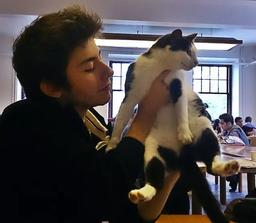In this lesson you will learn how to use verbs in the aorist tense. Since the aorist is a complicated tense in Turkish, it is divided into three lessons.
The aorist is a tense that is not very common in other languages. It roughly translates to the English present simple tense, but not always. Be ready to see aorist used for the translation of the English present tense, the English future tense and sometimes even the English past tense. You will first see how the aorist is conjugated, and then we'll show you some of the functions it performs.
The aorist is formed by taking the stem of a verb, appending an r, and then appending a personal ending. If the stem ends in a consonant, a vowel is first added as a buffer letter. This vowel obeys vowel harmony, but depends on the length of the stem. If the stem is monosyllabic, consisting of a single syllable, we add the buffer vowel E. If the stem is polysyllabic, consisting of multiple syllables, we add the buffer vowel İ.
| Regular Positive Aorist | Singular with Monosyllabic Stem | Singular with Polysyllabic Stem | Plural with Monosyllabic Stem | Plural with Polysyllabic Stem |
|---|---|---|---|---|
| First person | -(E)rİm | -(İ)rİm | -(E)rİz | -(İ)rİz |
| Second person | -(E)rsİn | -(İ)rsİn | -(E)rsİnİz | -(İ)rsİnİz |
| Third person | -(E)r | -(İ)r | -(E)rlEr | -(İ)rlEr |
The aorist is used in many situations. Below we list its most common functions, together with examples to make them clear. Note the differences in the suffix between verbs with monosyllabic stems and verbs with polysyllabic stems.
| Functions | Turkish | English |
|---|---|---|
| Habitual activity | Sinemaya genellikle sabah giderim. Her gün yeni bir şey öğrenirim. | I usually go to the cinema in the morning. I learn something new every day. |
| Idioms and proverbs | Dost acı söyler. | A true friend talks bitter. |
| Uncertain future plans | Belki yarın derse gideriz. | Maybe we will go to the lesson tomorrow. |
| Willingness to do something | Ben onu yaparım. | I'll do it. |
| Politeness | Teşekkür ederiz. | We thank you. |
| Polite requests | Kapıyı açar mısın? Lütfen kapıyı kapatır mısınız? | Could you open the door? Could you please close the door? |
| Commands | Okula gidersin. | You will go to school. |

